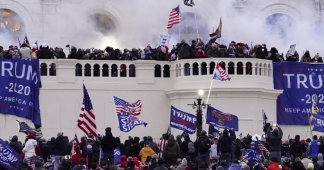“Corporations owe an explanation as to why they keep funding Donald Trump’s pawns in Congress who tried to finish what the insurrectionists started.”
By Jake Johnson
In the month of June, as the House January 6 committee revealed alarming new details on former President Donald Trump’s coup attempt, corporate trade groups and Fortune 500 companies donated more than $819,000 to the Republican members of Congress who voted against certifying the 2020 election results.
That’s according to a new analysis provided to Common Dreams by the watchdog organization Accountable.US, which has been tracking corporate contributions to the so-called “Sedition Caucus”—the group of 147 Republican lawmakers who, just hours after the January 6 attack on the U.S. Capitol, voted to overturn the 2020 election in an attempt to help Trump maintain his grip on power.
Accountable.US shows that since January 6, 2021, corporate trade organizations and the political action committees of top individual companies have donated a total of $21.5 million to Sedition Caucus members including House Minority Leader Kevin McCarthy (R-Calif.), Rep. Steve Scalise (R-La.), and Sen. Ted Cruz (R-Texas).
Those three lawmakers are among the 23 GOP members of Congress set to join Trump this week at the America First Policy Institute Agenda Summit, an event led by a think tank aligned with the former president. Trump is slated Tuesday to deliver the keynote address at the Washington, D.C. summit, which has been billed as an effort to outline a right-wing agenda as the former president gears up for another run.
McCarthy and Scalise have been the top recipients of corporate donations since January 2021, bringing in $701,000 and $617,500 respectively from corporate interests, some of which made a show of condemning the January 6 attack and voicing support for the democratic process.
“The more the January 6th committee details how close we came to losing our democracy, the more corporations owe an explanation as to why they keep funding Donald Trump’s pawns in Congress who tried to finish what the insurrectionists started by voting to throw out the 2020 election results,” said Kyle Herrig, the president of Accountable.US.
The group’s updated donation tracker shows that the National Beer Wholesalers Association Political Action Committee, the American Bankers Association PAC, Home Depot’s PAC, the National Automobile Dealers Association Political Action Committee, and Boeing’s PAC have been the top contributors to seditious Republicans since the January 6 attack.
In the month of June, the top donors were the National Cotton Council of America Committee For The Advancement of Cotton, Regions Financial, the National Cattlemen’s Beef Association Political Action Committee, Charter Communications, and Verizon Communications.
Several PACs, including the Snack Food Association Political Action Committee and the National Air Transportation Association Political Action
Committee, donated to Republican election objectors for the first time since the insurrection after the House January 6 panel’s series of public hearings began last month, according to Accountable.US’ review of campaign finance disclosures.
“Companies that claim to support democracy but fail to align their political spending with their stated values need to make it clear to their customers, shareholders, and own employees that they value something much more—having political influence over lawmakers no matter how dangerous their views,” said Herrig.
“Companies that dismiss the majority of Americans who want to see businesses more engaged in the defense of democracy,” Herrig added, “do so at the risk of their reputation.”
We remind our readers that publication of articles on our site does not mean that we agree with what is written. Our policy is to publish anything which we consider of interest, so as to assist our readers in forming their opinions. Sometimes we even publish articles with which we totally disagree, since we believe it is important for our readers to be informed on as wide a spectrum of views as possible.











